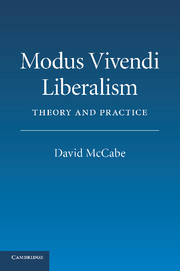Book contents
- Frontmatter
- Contents
- Acknowledgments
- PART I STARTING ASSUMPTIONS
- PART II THE FAILURE OF THE MAIN ARGUMENTS
- PART III MODUS VIVENDI LIBERALISM
- 7 The case for modus vivendi liberalism
- 8 The challenge of gender equality
- 9 Compulsory education in the MVL state
- 10 The limits of modus vivendi liberalism
- Bibliography
- Index
9 - Compulsory education in the MVL state
Published online by Cambridge University Press: 06 July 2010
- Frontmatter
- Contents
- Acknowledgments
- PART I STARTING ASSUMPTIONS
- PART II THE FAILURE OF THE MAIN ARGUMENTS
- PART III MODUS VIVENDI LIBERALISM
- 7 The case for modus vivendi liberalism
- 8 The challenge of gender equality
- 9 Compulsory education in the MVL state
- 10 The limits of modus vivendi liberalism
- Bibliography
- Index
Summary
ROBUST LIBERAL EDUCATION
Debates over education in liberal states reflect both practical and conceptual challenges. At the practical level, education represents both a substantial cost to parents (through tax-funded schools) and a far-reaching intrusion into their children's lives. Disagreement among parents over the nature of that education is thus bound to create controversy among liberal citizens. But these debates also point to serious and revealing tensions at the heart of liberalism. For example, liberal states distinguish between adults, who have equal claims to extensive freedom, and children, who are not fully capable of exercising freedom responsibly. But children learn those skills within families, themselves important areas for the expression of freedom. How then to balance family privacy with the legitimate concern over children's development? Or consider that education seems to require consensus on which achievements, skills, and ideas are especially worthwhile. The liberal state, however, is in part defined by its not taking sides in such debates. Or again, consider the place of patriotism within liberal education. While some regard schooling as a unique opportunity to instill patriotism and cognate attitudes, others argue that the ideal of moral equality rules out any attempt to instill moral partiality.
A major challenge in entering such debates is to say something correct that goes beyond mere bromide. That children are not the chattels of their parents, that parents rightly have some say over their children's values, that liberal states function better if citizens display certain virtues – no one denies these truisms: getting beyond them is the hard part.
- Type
- Chapter
- Information
- Modus Vivendi LiberalismTheory and Practice, pp. 196 - 237Publisher: Cambridge University PressPrint publication year: 2010

